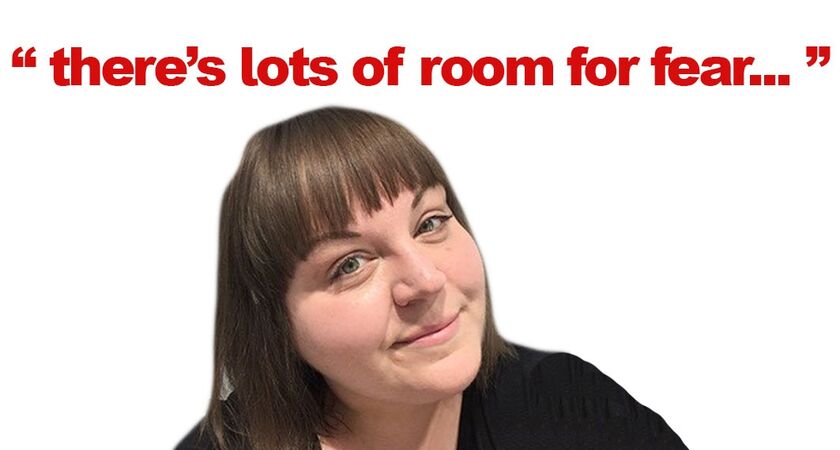Blog
Starting the conversation

Gillian Leno, intimate relationships teacher, writer and researcher, writes about the lasting impact of collaborative work.
There is brilliant work happening, but it’s in pockets – imagine if this was openly talked about, strengthened, discussed, challenged? The power and impact of collective work could be widespread and lasting.
I’m a full-time sex and relationships teacher, writer, and researcher, working with people who have learning, physical and sensory disabilities as well as autism spectrum conditions. I’m based in a college for young adults aged 16-25 with a wide range of support needs, but I provide training for other professionals around supporting sex, relationships and sexuality in various settings, including education and care, too. I also work alongside parents, carers and families. I know I’m biased (having been lucky enough to turn something I’m really passionate about into the focus of my job) but I really do think that this is absolutely crucial.
On the surface, it could be argued that the rights, and lives, of people with learning disabilities are becoming more and more visible. Stories of success are celebrated. We share online articles about entrepreneurs, models and teachers with Down's Syndrome, autism spectrum conditions, and a whole host of other conditions that once might have been seen as an impairment to a rich and happy life. Television programmes such as The Undateables, whether you like it or not, have at least opened some conversations up and hopefully shown that people with learning disabilities not only want intimate relationships and experiences, but that they are just as capable of making a success of them as anyone else. So far, so good – even if it could be argued that it’s taken a disproportionately long time for such things to be included in the common consciousness.
However, from where I am standing, the picture isn’t quite so clear. I’m not so sure that the recognition and appreciation of rights extends to those concerning intimate relationships, sexual health, and privacy. Every time I run a training course for professionals, I hear a host of stories about clients that the course participants are keen to support, but are facing significant barriers in doing so. At the start of each workshop, I ask everyone what it is that they’re aiming to take away with them, and every single time, it’s clarity and information about how they can help to facilitate the rights of their clients whilst protecting themselves professionally. These issues are echoed by the people with learning disabilities that I work with directly, whether they are the students here at the college, or out and about in community sessions for adults. I hear from parents who are fearful about their sons and daughters being able to access help and support, as well as parents who are just plain fearful – and who could blame them? We seem to get trapped in a position where good intentions are difficult to back up with actions because of a lack of resources, capacity, information, and understanding.
Supporting intimate relationships and sex are often not included in training for professionals and care staff, and not explicitly included in policy or guidance either.
Having said all that, it’s clear that the barriers that are in place are often there, at their core, because of those good intentions. Professionals who work with people with learning disabilities, in whatever capacity, are bound to protect their clients from being exploited and to ensure that they are safe and well, emotionally and physically. Because supporting intimate relationships and sex are often not included in training for professionals and care staff, it means that it might not be explicitly included in policy or guidance either. Potentially, that just leaves a big gap, with no boundaries or provision – or protection! – for staff or clients.
I really feel that many of the barriers that are faced not only by people with learning disabilities who just want to get on with their lives, but also by those who are trying to support them, are exacerbated by this lack of guidelines or reassurance for staff and carers to follow. Without that, there’s lots of room for fear of having no back-up there if anything goes wrong or is disputed. Staff face the prospect of potentially being in the firing line should any negative situation arise, and quite aside from all that, it’s clear to me that there’s often a real worry of doing the wrong thing. ‘What happens if…what are my responsibilities about…I’m not comfortable about this but I’m not sure if I can refer it without negative consequences…’and so on. If there are guidelines and policy, then the next hurdle is often consistency. If both partners do have support plans and staff, but there’s a difference in thinking about how things should be from the two sides, I all too often hear how this has just left people stuck – staff AND client.
The more conversations I have – with staff, with parents, with clients – the clearer it seems that there’s a real and urgent need for there to be open conversations about intimacy and the importance it plays in people’s lives. Sex and body positive education needs to happen, but that applies for everyone, and it’s important that people who are providing support around this are, in turn, supported. There can be no good results unless there’s consistency, and safe spaces to discuss fears and difficulties, both professional and personal. It’s often the case that those of us tasked with the privilege of providing this support may have faced our own barriers in accessing information and help, and there has to be a recognition that it can be a great challenge. It makes sense that unless people with learning disabilities are supported compassionately to explore their intimate lives and relationships – whatever that entails for them – safely and with dignity, they are being failed. Autonomy over our bodies, our sexual lives and our relationships is at the core of our identity, our wellbeing and – ultimately – our ability to take our places successfully amongst our peers, and as such this has to be addressed for everyone, or it’s failing.
Where does this leave us? A network is an excellent starting point. There is brilliant work happening, but it’s in pockets – imagine if this was openly talked about, strengthened, discussed, challenged? The power and impact of collective work could be widespread and lasting. The conversations are starting to take place – now they need to be louder, ongoing, so noisy that people have to stop what they’re doing and listen. If that happens, who knows? Perhaps they’ll start to join in!
Gillian Leno
The views expressed in the Supported Loving blog are not necessarily those of Choice Support.






